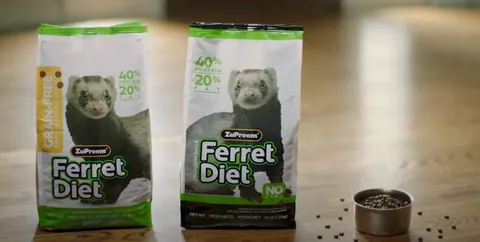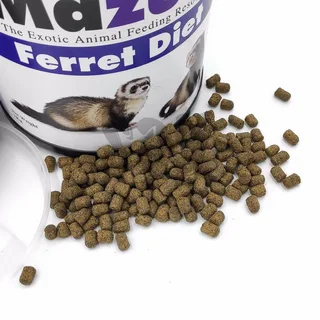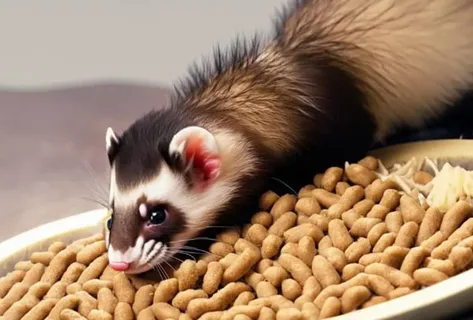Ferret diet is crucial for your pet’s health and happiness. In this guide, learn what to feed your ferret to ensure balanced nutrition. Discover tips on choosing high-quality food, creating a feeding schedule, and avoiding harmful ingredients. Keep your ferret active, energetic, and thriving with the right diet choices.

Introduction
Ferrets are adorable, intelligent, and endlessly playful companions. But to keep them healthy and full of life, you need to understand their unique dietary needs. Unlike other pets, ferrets require a diet high in animal protein and fat, with virtually no carbohydrates. In this guide, you’ll learn exactly what to feed your ferret, what to avoid, and how to ensure they stay happy and healthy for years to come.
Why Ferrets Need a Specialized Diet?

Ferrets have a digestive system built for meat—literally. Their short intestinal tract means food passes through quickly, often in just 3-4 hours. This means they need frequent meals packed with easy-to-digest nutrients. Ferrets also lack the ability to process complex carbohydrates and fiber found in plants. Unlike omnivores, they simply can’t convert plant matter into usable energy.
A ferret diet should be:
- High in animal protein (at least 35-40%) to support muscle development and energy needs.
- High in fat (at least 15-20%) because ferrets rely on fat as their primary fuel source.
- Extremely low in carbohydrates and fiber (ideally under 5%) since these ingredients can cause digestive issues and serious diseases like insulinoma (pancreatic tumors linked to high-carb diets).
What to Feed Your Ferret?
1. High-Quality Commercial Ferret Food
The easiest option for most ferret owners is premium commercial ferret food. But not all brands are created equal. Choose foods that list animal-based proteins as the first ingredients and avoid products with grain fillers, corn, or high-carb content.
Look for:
- Minimum 35% animal-based protein
- 15-20% fat
- No artificial colors, grains, or sugars
- Brands like Wysong and Totally Ferret are often recommended by ferret-savvy vets.
2. Raw Diet (Whole Prey Feeding)

Some experienced ferret owners prefer raw or whole prey diets. These diets best mimic what wild ferrets eat—small mammals, birds, and insects.
A raw diet may include:
- Raw chicken wings, necks, hearts, and liver
- Whole prey like frozen feeder mice or chicks
- Rabbit or quail parts (meat, bone, organs)
If you choose this route, balance is critical. Too much muscle meat without bone or organ can lead to nutritional deficiencies. Consult an exotic pet vet or nutritionist before switching your ferret to a raw diet.
3. High-Protein Kitten Food (Temporary Alternative)
In emergencies, high-protein kitten food can work as a stopgap measure. It should be high in meat content, with minimal grains and fillers. However, it’s not ideal for long-term feeding since it isn’t specifically formulated for ferret needs.

Foods to Avoid

Some foods that are healthy—or at least harmless—for other pets can be dangerous to ferrets. Never feed your ferret:
- Dog food or adult cat food: These are usually too low in protein and fat.
- Fruits and vegetables: They contain fiber and sugars that ferrets can’t digest.
- Grains, corn, bread, or cereals: High-carb fillers that can cause insulinoma and obesity.
- Dairy products: Ferrets are lactose intolerant.
- Sugary treats and human snacks: These can lead to serious health issues.
- Cooked bones: These can splinter and cause fatal intestinal damage.
How Often Should You Feed Your Ferret?
Because of their fast metabolism, ferrets need to eat frequently. Many owners free-feed dry kibble so their ferret can nibble throughout the day. If you’re feeding raw or fresh food, serve small portions 4-6 times daily.
Always provide fresh, clean water. Dehydration can quickly become dangerous for ferrets, especially on high-protein diets.
Signs Your Ferret Has a Healthy Diet

A balanced ferret diet should lead to:
- A sleek, shiny coat: Dull or thinning fur often indicates dietary issues.
- Bright, alert eyes: Cloudy or sunken eyes may signal illness.
- Consistent, firm stool: Chronic diarrhea suggests an inappropriate diet.
- Steady weight: Rapid weight gain or loss can mean nutritional imbalance.
- High energy: Lethargy often points to underlying health or dietary problems.
- If you notice any of these red flags, consult an exotic pet veterinarian immediately.https://furryferrets.com/how-to-nurse-a-ferret-back-to-health/
Transitioning to a New Diet
Ferrets often imprint on their food in early life, meaning they can be stubborn about trying new things. To switch diets:
- Mix a small amount of the new food into the old food.
- Gradually increase the proportion of new food over 7-10 days.
- Observe your ferret closely for digestive upset during the transition.
- Patience is key. For particularly picky ferrets, slow transitions over several weeks might be necessary.https://www.ferret-world.com/ferret-raw-diet-plan-pros-cons
Supplements and Treats
Generally, a balanced ferret diet doesn’t need additional supplements. Avoid vitamin or mineral supplements unless directed by your vet, as overdosing can be harmful.
For treats, stick to high-protein options like small pieces of cooked meat, freeze-dried raw treats, or specialty ferret treats with minimal carbs and sugars. Limit treats to less than 10% of their daily intake.
Common Myths About Ferret Diet
- Myth: Ferrets can eat vegetables or fruit for variety.
- Truth: Even small amounts can cause digestive upset and health issues.
- Myth: Dog food is fine for ferrets.
- Truth: It lacks the high protein and fat ferrets need.
- Myth: Ferrets need variety in their diet.
- Truth: Ferrets often do better with consistent, nutritionally balanced food—sudden changes can stress their digestive system.
Conclusion
Feeding your ferret isn’t just about filling their bowl—it’s a foundation for their long-term health and happiness. A proper ferret diet should be high in animal protein and fat, low in carbohydrates, and tailored to their unique physiology. Whether you choose high-quality kibble or raw feeding, keep their needs in mind, watch for signs of imbalance, and consult a vet experienced with ferrets for personalized advice.
Your ferret’s boundless playfulness and joy depend on the fuel you provide. Give them the best chance at a healthy, mischievous life—one meal at a time!
FAQs About Ferret Diet
Q1: Can I feed my ferret fruits and vegetables as treats?
No. Ferrets cannot digest plant matter properly. Fruits and vegetables are high in fiber and sugar, which can cause digestive issues and serious health problems over time.
Q2: How often should I feed my ferret each day?
Ferrets have fast metabolisms and should have constant access to food, especially high-quality dry kibble. If feeding raw, provide 4–6 small meals spread throughout the day.
Q3: Is raw feeding better than commercial ferret food?
A balanced raw diet closely mimics what ferrets eat in the wild and can be very healthy if done properly. However, it requires careful research and planning. High-quality commercial ferret food is often more practical and safer for most owners.
Table of Contents

